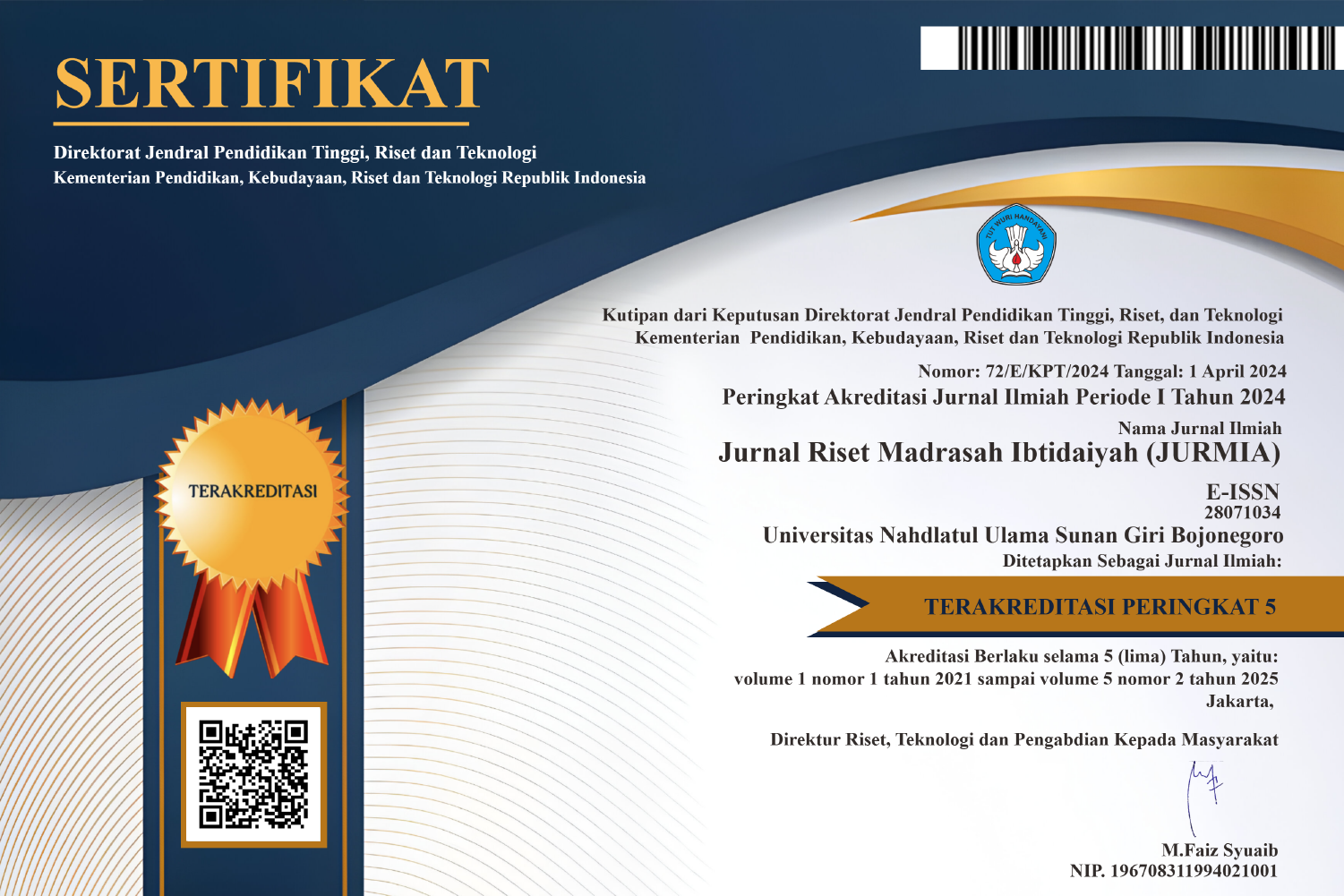Assessment of Role of Parental Role in Curbing Empty Calories Consumption in Primary School Children in Gwadabawa

DOI:
https://doi.org/10.32665/jurmia.v5i2.5229Keywords:
emty calories, parent, primary school, diabetes, hypertensionAbstract
Nowadays, the consumption of empty calories is predominating in various societies, including among the children. This is sad, because it is link to adversaries such as hypertension, cancer, diabetes, etc. Thus, this study examined the role of parents in curbing empty calorie consumption among primary school children using a survey method among 160 respondents (key informants). A questionnaire was utilized in conducting the survey research and the findings revealed that parents play a significant cognitive and behavioral role in promoting healthy eating habits among children. Cognitive roles included providing basic nutrition education (63.8%), helping children understand food labeling (21.3%), and meal planning (15.0%). Behavioral roles included demonstrating healthy eating (23.8%), providing healthy food options (38.1%), and monitoring food intake (19.4%). However, factors such as poor nutritional awareness (35.0%), poverty (41.9%), and work-life balance (23.1%) hindered parental involvement. Initiatives to improve parental involvement included creating nutritional awareness (49.4%), legislation (20.0%), job creation (13.1%), and counseling on work-life balance (17.5%). The study highlights the importance of parental involvement in promoting healthy eating habits among children.
References
Abubakar, A.U. & Raji, I.A. (2021). Status of public primary schools: Safety, health service provision and environmental health facilities in Sokoto Metropolis, Northwestern Nigeria. Asian Journal of Medicine and Health,19 (11), 22-31.
Anderson, M.L., Galloghe, J. & Ritchie, E.R. (2018). School meal quality and academic performance.
Angwaomaodoku, E. A. (2023). The impact of parental involvement on students' academic achievement in Nigeria: A case study of parents in Asaba, Delta State. International Journal of Education, 15(4), 37-50.
Anuodo, AO., Owoeye, M.O., Ogbonmwan, I.M. & Oke, M.A. (2021). Snacking and junk food consumption among primary school children: Who takes responsibility, the home or school. Journal of Positive Psychology and Counselling, 9(2021), 261-269.
Arghode, V. Brieger E.W. & McLean, G.N. (2019). Adult learning theories: Implications for online instruction. European Journal of Teaching and Development, 41(7), 593-609.
Arunraj, G. (2019). The role of parents' involvement on children's education. International Journal of Advance Research and Innovative Ideas in Education, 1(2), 19-22.
Arya, G. & Mishra, S. (2023). Effects of junk food and beverages on adolescents health- a review article. IOSR Journal of Nursing and Health Science, 1(6), 26-32.
Ashakiran & Deepthi, R. (2022). Fast foods and their impact on health. Journal of Krishna institute of Medical Sciences University, 1(2), 7-15.
Bashar, T.A. (2025). An appraisal of the role of Qur'an and Madrasa education in the Sokoto Caliphate. Global Academic Journal of Linguistics and Literature, 7(1),10-13.
Bello, M.B., Daramola, D.S., Yusuf, A., & Amali, I.O., (2017). An evaluation of access to universal basic education in sokoto state, Nigeria. Asia Pacific Journal of educators and Education, 32, 61-72.
Ceka, A., & Murati, R. (2019). The role of parents in the education of children. Journal of Education and Practice, 7(5), 61-64.
Cohen, J.F.W, Rimmm, E.B., Davism, K.K., Cash SB, Mclnnis K., & Economos CD. (2020). The role parents and children in meal selection and consumption in quick service restaurants. Nutrients, 179735), 1-12.
El Haq, A. S., & Apriyanti (n.d.). Parental involvement in children's education. Proceedings of the 3rd English National Seminar.
Gado, M.A., & Alkammawa, H.L. (2017). Primary education as a means of achieving sustainable development; An assessment of Universal Basic education(UBE)program in Nigeria. Saudi Journal of Humanities and Social sciences, 2(9), 790-795.
Lemea-Adoma, R.W. (2024). An overview of the management of early childhood education policy and planning in Nigeria. International Journal of Institutional Leadership, Policy and Management, 6(3), 288-297.
Lipayan, I.C. (2019). The role of nutrition in the academic performance of students in the public school. IUOSR Journal of Humanities and Social Science, 24 (12), 48-60.
Minj, A. (1999). Parental involvement and its perceived impact on children's achievement. Master's thesis, Marquette University, USA.
Mncube, V. (2020). Parents' involvement in education of their children: Case study of two selected secondary schools in the Amathole West District. Master's thesis, University of Fort Hare.
Mohamed, H.A. & Farg, H.K. (2019). Effect of eating pattern on scholastic achievement among primary school children in Anshas El-Raml Village. International Journal of Novel Research in Healthcare and Nursing, 3(2), 177-184.
Nasiru, B.S., Musawa, T.S., Hassan, H.M, & Ejembi, E.A. (2019). Exploring the perceived factors that lead to substance abuse among youth in Northern Nigeria. Advance Research Journal of Medical and Clinical Science, 5(9), 15-23.
Rabia, Waheed, S. A., & Gilani, N (2023). Primary School Social Studies Curriculum: Comparison of National Curriculum (NC) 2006 and Single National Curriculum (SNC), University of Wah Journal of Social Sciences, 6(1), 71-80.
Raingruber, B. (2020). Health promotion theories. Joes and Barlette Learning, LLC.
Rielly, T. (2022). Material feeding behavior, children’s eating behavior, and weight status among preschool aged children in the united states. Thesis submitted at the University of New jersey.
Rotshak, J.Y., Mukhtar S., & Podos, J.N. (2020). Analysis of early childhood education and integrated childhood development in Nigerian public schools. American Journal of Humanities and Social Sciences Research, 4(8), 275-281.
Sarkingobir, Y. & Tukur, U. (2024). Effects of Drug abuse on primary Education: An overview context. JURMIA, 4(1), 85-95.
Sarkingobir, Y., & Miya, Y.Y. (2024). Empty Calories in Processed Foods: A Comprehensive Review of Dietary Implications. Kashmir Journal of Science, 3(04), 67-88. Retrieved from https://kjs.org.pk/index.php/kjs/article/view/57.
Solagberu AM.B. (2021). Nana Asma'u: A Model for the contemporary Nigerian Sufi women leaders. Islamic Studies, 60(4),399-409.
Subhalakshmi, K. & Dhanasekar, M. (2019). A study on fast food culture among teenagers in urban India. International Journal of Pure and Applied Mathematics, 120(5), 215-226.
WHO (2006). Food and nutrition policy for schools. EUR/o6/5073063
Williams, B., Williams, J., & Ullman, A. (2022). Parental involvement in education. Research Report.
Downloads
Published
Issue
Section
License
Copyright (c) 2025 Yusuf Sarkingobir, Ummu Tukur, Syed Abdul Waheed

This work is licensed under a Creative Commons Attribution 4.0 International License.
 PDF Download: 91
PDF Download: 91










